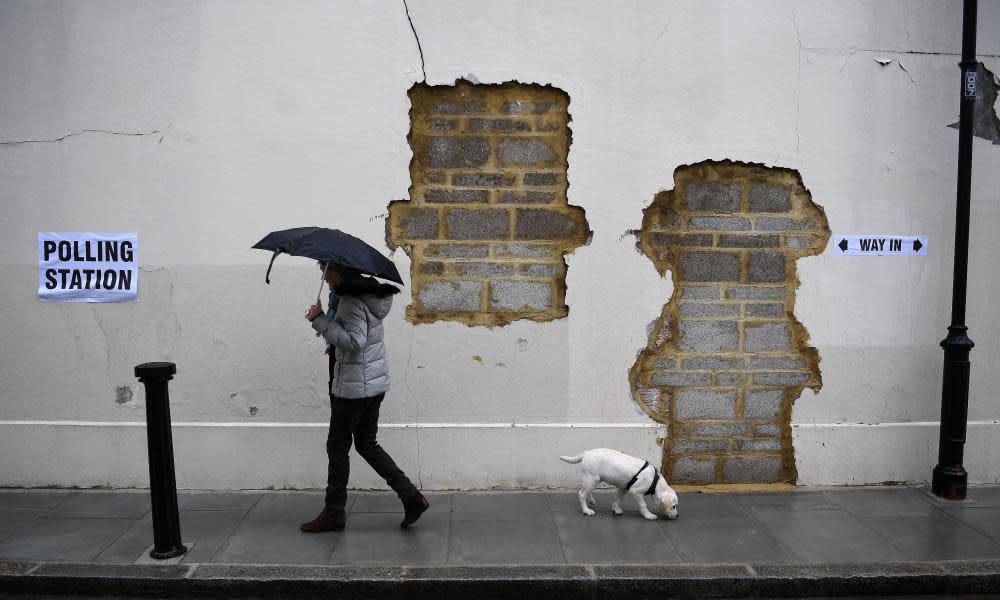Whoever wins this election needs to show some humility

You lost. Get over it.
Nothing sums up the sour mood of post-Brexit politics like that nasty little mantra, which erupted online immediately after the 2016 referendum and has lingered ever since. When leavers won their surprise victory they had a chance to respond magnanimously, inviting a bruised 48% into the process of deciding how to manage the departure and addressing their fears. But too many simply sneered at remainers instead, and so the divide hardened. Our toxic political culture is the price we have paid ever since for failing to secure losers’ consent.
There has been much talk lately of bringing the country back together, yet revisiting Brexit in a general election that was simultaneously about so many other starkly divisive issues has achieved the opposite. Losing always hurts, but with the two main parties poles apart on almost everything that matters and with so much at stake, this result may be harder than usual for the losing side to accept. Even so, it might not be too late to start trying to put the broken pieces back together.
True, I’m writing this in the calm before the storm: that eerily still moment on polling day just after voting but before knowing the result, when anything is still possible even if most things seem unlikely. Soon, doors now ajar will be slamming shut. But whoever emerges victorious, whether instantly with a majority or slowly and only after prolonged horse-trading, should do so with a hefty dose of humility. It’s not just the losers they need to convince this time.
If one party isn’t playing by the rules, the others soon realise that doing so puts them at a competitive disadvantage
There will have been plenty of people thrilled on Thursday by the chance to vote for the politician of their dreams, but many others will have voted tactically, or while burying serious qualms.
More than any I remember, this was an election when voters were urged to vote against rather than for something. Forget your nagging worries about Boris Johnson’s mendacity or your unease about antisemitism in the Labour party; just feel the fear and vote to stop the other guy. Green, Lib Dem and other minority party voters have been guilt-tripped into abandoning their natural preference for fear of something worse. Whoever governs next will do so partly thanks to borrowed votes, and should be sobered by that knowledge.
New prime ministers invariably reach for unifying words on the steps of Downing Street – even Margaret Thatcher quoted the prayer of St Francis of Assisi in 1979 – but few live up to them. This time, we need actions as well as words.
Any attempt at national reconciliation must start with all those lately made to feel unwelcome in their own country. Many Jews have spoken of potentially fleeing Britain if Jeremy Corbyn won, but many ethnic minority voters have said they’d feel equally unsafe under Johnson; both may find it hard to forget other Britons’ apparent willingness to throw them under the bus in an election, whatever the result.
The hurt caused to EU nationals living in Britain when the Tory leader accused them of treating it like their “own country” cannot be underestimated either, since for many the UK does feel like home. Whoever wins has a moral responsibility to repair the damage, committing to act promptly on any findings from the pending Equality and Human Rights Commission inquiry into Labour antisemitism and ensuring the much-promised inquiry into Islamophobia within the Conservative party actually happens; new MPs should resolve to represent EU nationals living in their constituencies as vigorously as if the latter had a vote.
The second priority is ensuring that we never have an election campaign this dishonest again. Johnson has pushed against accepted political norms – the idea that political advertising stays roughly within the boundaries of truth, say, or that prospective leaders submit to searching interviews – and found them alarmingly flimsy. And if one party isn’t playing by the rules, the others soon realise that doing so puts them at a competitive disadvantage.
It will be for the new parliament to stop the rot. The lesson of the Westminster expenses scandal was that egregious cheating by some members of parliament rebounded on all of them, because after a while voters just stop distinguishing between individuals and assume that all of them are probably at it. So it is with lying: before long, nobody’s words are believed.
News organisations should reconsider giving aspirant prime ministers free publicity for silly campaign stunts if they won’t also do tough interviews. And while anonymous sources still serve important purposes in journalism, anyone routinely abusing the privilege in order to lie without accountability cannot expect to remain anonymous.
Related: Stop worrying about 'tribalism' – politics is supposed to be passionate | Alan Finlayson
Meanwhile, since the Institute for Fiscal Studies’ warning that neither Labour nor Tory spending plans were economically credible had little discernible effect on either party, there’s a good case, too, for pre-scrutiny of manifestos by the independent Office for Budget Responsibility, as Labour’s John McDonnell has suggested, so that voters can be sure the figures add up.
But perhaps the biggest task facing this prime minister is to earn, not assume, national consent. That means leading in the broad national interest, not a narrow sectarian one; fostering the belief that those with whom you disagree may still have something worthwhile to contribute; and striving to represent the half of the country that will feel grievously cheated whatever comes of Brexit. We should have learned by now what happens when losers are simply left to stew in it.
• Gaby Hinsliff is a Guardian columnist

 Yahoo News
Yahoo News 
